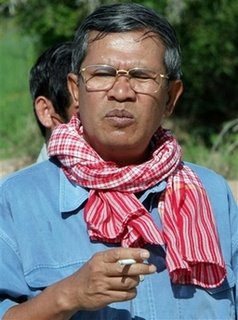 Oct 18, 2010By Robert Carmichael
Oct 18, 2010By Robert Carmichael
DPAPhnom Penh - A decade ago a packet of Marlboro cigarettes cost just a dollar a pack in Cambodia, manna from heaven for a smoker who had lived in London where it was six times that price.
Today that same packet costs 1 dollar and 5 cents, which is now one-10th the London price. Local brands start at just 20 cents. In short, smoking in Cambodia is - as in many developing countries - very cheap.
Price goes a long way to explaining why this impoverished nation has one of the highest smoking rates in the region: Almost one Cambodian male in two above the age of 15 smokes. Among women the rate is lower - just 4 per cent smoke, but nearly one in five chews tobacco.
So it is no surprise that health campaigners have cheered the government's progress towards meeting its obligations under the Framework Convention on Tobacco Control (FCTC), which it ratified in 2005.
But that progress is slow. A draft tobacco control law to regulate the industry in line with the FCTC is being batted about government committees and ministries, but it took seven years just to get there.
Despite the delays, the proposed draft law is welcomed by Dr Yel Daravuth, tobacco control expert at the World Health Organization's office in Phnom Penh.
He explains that banning advertising, a key requirement of the FCTC, is a proven way to cut smoking rates.
'If a (developing) country has a total ban on advertising, tobacco promotion and sponsorship, the result within 10 years (is that) the smoking prevalence goes down 8 per cent,' he says.
One that lacks a total ban, however, will see rates drop just 1 per cent.
Cambodia's proposed law bars advertising of any description, as well as any promotions linked to cigarettes or attempts to advertise to youth.
Additionally the World Bank wants the government to tax cigarettes heavily, which raises the price and cuts demand. Yel Daravuth says Thailand did just that, managing both to lower the smoking rate and increase tobacco-related taxation revenues.
The government wants the smoking prevalence down 5 percentage points over the next five years, and Yel Daravuth says achieving that should also cut poverty rates.
'Smokers spend at least 9 per cent of their daily income to buy cigarettes - a huge amount,' he says. Money that could instead be spent on education and food.
The draft law is part two of Cambodia's staccato efforts to stem smoking. Earlier this year legislation compelled tobacco companies to place warnings about the dangers of smoking over one-third of each pack.
Compliance is still a work in progress - the companies have another six months to get their houses in order - but some packs already sport the warnings.
It amounts to a sea change for tobacco firms operating here, among them the world's biggest such as British American Tobacco Plc (BAT) and Japan Tobacco Inc.
BAT has the lion's share of the local market and claims to welcome the moves, provided the rules are applied equitably. But Kun Lim, the firm's head of corporate affairs, says BAT wants to retain point of sale (POS) advertising.
Dr Mom Kong, who heads the Cambodian Movement for Health, a non-governmental organization that campaigns against tobacco and alcohol, says retaining POS would go against the framework.
It would also outlaw billboards and one-on-one marketing where young women hand out free smokes in restaurants.
Most egregious to Mom Kong is the effort by some tobacco firms - not BAT, it should be said - to market to children and teenagers at pop concerts.
'The tobacco industry invites a young celebrity to make propaganda about tobacco,' Mom Kong says. 'In one concert you can see thousands of youths - imagine if only 1 or 2 per cent of the audience starts to smoke, how many children and teenagers will become smokers?'
That sort of promotion will also be barred.
But the key question is: When? Just last week media reports suggested the new law might not come into effect until 2015. At least part of that delay is due to wrangling between different ministries over taxation.
But changes are afoot, as almost a dozen ministries now have smoke-free rules, and it is common to see no-smoking signs in shopping malls, coffee-shops and restaurants.
And regardless of the law's final shape or implementation date, campaigners are confident the number of male smokers will start to tick downwards once the government finally wheezes its way past the finishing post.





























